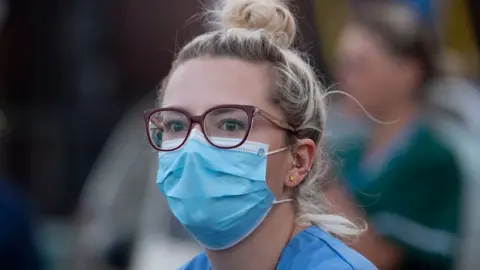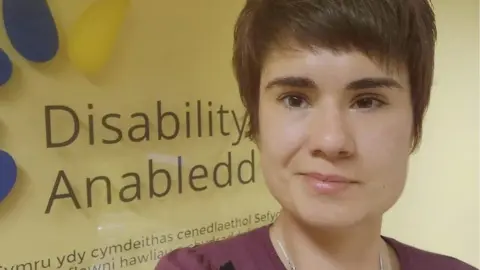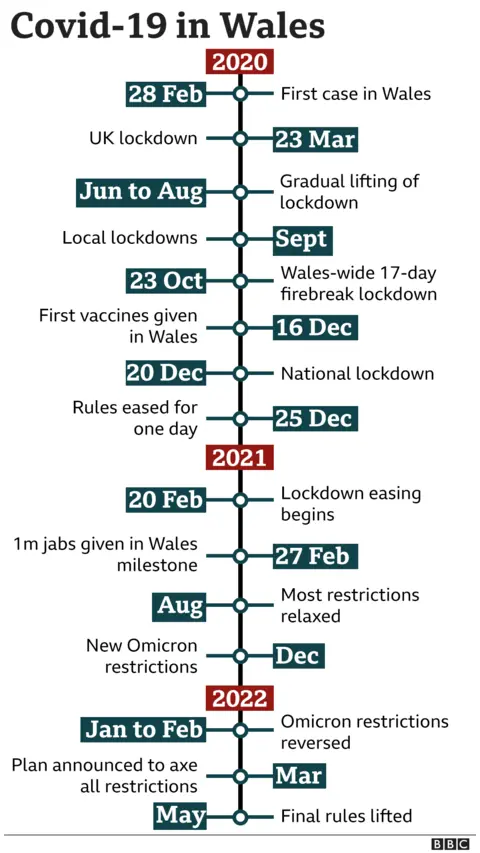Covid in Wales: Hospital mask rule ends as emergency law expires
The wearing of face masks will no longer be legally required in Welsh health and social care services from Monday.
First Minister Mark Drakeford confirmed the ending of the last of Wales' Covid rules, which have been in place in some form since March 2020.
Ministers said the public health situation had continued to improve over the last few weeks.
Wales was the last part of the UK with Covid restrictions still in place.
However most of the rules that affected people's day to day lives, such as wearing face masks in shops and on public transport and self-isolation rules, ended in March.
 Getty Images
Getty ImagesThe number of people estimated to have Covid-19 in Wales has fallen for the sixth week in a row.
However the Welsh government said the NHS continued to experience "emergency and pandemic pressures".
Guidance will remain in place strongly recommending the use of face coverings in health settings to help protect the most vulnerable.
Announcing the decision in a news conference, Mr Drakeford said authorities were planning to deal with Covid like "any other seasonal illness" from now on.
But he warned measures were in reality "on hold" in case of another wave - with two new variants already being monitored by health officials.
"We have learned, time and again, that this virus can behave in ways that are neither expected nor predictable," he said.
He said that the Welsh government was "ready to bring back testing and contact tracing", should that be needed.
Booster vaccines are already being made available for the autumn, and ministers are encouraging people to get a flu jab later this year.
Early indications were that ministers would be advised to offer an annual Covid jab in future years, the first minister added, possibly only to older age groups and the most vulnerable.
 Getty Images
Getty ImagesDespite the changes to rules on face masks, Helen Whyley, director of nurses union RCN Wales, asked people to continue wearing them in healthcare settings if asked.
She said: "The legal requirement may be removed, however health and social care professionals across settings are still asking people to think carefully about wearing a mask when attending appointments or visiting friends and family. In some circumstances staff may ask you to wear a mask.
"I am encouraging everyone to be respectful with these requests to help keep the people of Wales safe and health care services recover from the pandemic."
Care Forum Wales said the decision was a "step towards the normality everyone wants" but admitted there would be a mixture of emotions.
"It's impossible to estimate the level of trauma people have gone through in the sector," chief executive Mary Wimbury told Radio Wales Breakfast.
"It's going to have to be risk assessed for each sector.
"Sometimes you're going into people's homes where there is a lot of people in and out throughout the day, not wearing masks, and it's going to be great for staff not to have to [wear them] throughout the summer.
"Equally there is going to be vulnerable people you are still visiting and they will want you to wear masks.
"We understand why the restrictions have continued, but it is all about balance."
 James McCarthy
James McCarthyLucy Taylor, from Newport, has cystic fibrosis and shielded during the pandemic.
The 29-year-old said it had taken her a long time to be able to venture out and she continued to wear her mask at work.
She said: "It's better for me to live normally again.
"I think if I don't do that I'll just go back into my shell and I'm going to be so scared of going out, that I'm not going to want to go out."
 Disabilies Wales
Disabilies WalesAlex Osbourne, from Caerphilly, works for the charity Disability Wales and has been shielding since the start of the pandemic due to her multiple sclerosis (MS).
"I'm quite anxious about this," she said, of the final rule being dropped.
"Masks made me feel a bit safer. I have to go to hospital quite a lot so the idea that they won't be worn there anymore is really stressful.
"I understand people don't want to wear them anymore, but it's very stressful for people like me with no immune system who don't have that same confidence as everyone else to start mixing again."
How are the latest Covid figures?
There were an estimated 52,900 people with the virus, according to the weekly swab survey of thousands of households in Wales by the Office for National Statistics (ONS).
The ONS said this was one in 55 people - or 1.74% of the population, in the week ending 21 May, a reduction for a sixth successive week.
Daily estimates have infections highest in those in their early 40s and lowest in those over 80.
And in hospitals?
Latest hospital figures in Wales showed on Thursday there were only 25 acute patients with Covid who were being actively treated for the virus.
According to Digital Health and Care Wales figures, 85% of patients who tested positive for Covid were in hospital to be treated for something else.
Looking at patients testing positive for Covid in all hospitals, the average in the last week has dropped by 27% to 215 - the lowest average since last August.


Welsh Conservative shadow health minister Russell George said he was delighted that Covid regulations were ending.
He said: "Not only do we need to remember all those who lost lives and loved ones to lockdowns and the virus itself, but learn the lessons about how we can counter another pandemic and assess the impact of deploying harsh emergency restrictions on our population.
"But none of us will ever get the answers we deserve without the Wales-specific public inquiry everyone in the country wants apart from, not surprisingly, the Labour government who run scared of scrutiny."
Answering journalists' questions, Mr Drakeford again rejected such an investigation, saying he was "confident" the UK inquiry, chaired by Baroness Hallett, was "sensitive to the needs of Wales".
A Welsh-only probe "would not provide the answers people rightly would expect from an inquiry", he added.
Plaid Cymru health spokesman Rhun ap Iorwerth said he shared the "nervousness among health professionals about the removal of the need to wear masks in health and care settings, because of vulnerability of so many in the sector".
"[The] Welsh government must make sure they monitor very carefully the extent to which people follow the guidance for people to continue wearing them in these settings," he added.
Now that the Covid regulations are going, Mr ap Iorwerth said, "we owe it to our hard-working staff" to "bring our health service on to a more sustainable footing, by reducing waiting times, speeding up the patient journey, and joining up health with social care".
What was Wales' Covid law?
Although the requirement to wear a face covering in health and social care was not part of the original legislation, coronavirus rules in Wales have existed in some form since March 2020.
The law was used to impose strict curbs on people's day to day lives, including three stay-at-home lockdowns, restrictions on travel and on what businesses could and could not do.
In Wales masks became obligatory in all indoor public places in September 2020.
Powers under public health legislation meant the rules could be imposed quickly, without always having to go to the Senedd for a vote first. Welsh ministers added and removed measures as the Covid situation changed.
Initially the rules were largely the same across the UK, although this changed as England reopened in the summer of 2020, and differences developed between the different nations.
Mr Drakeford's approach to sometimes ease restrictions slower than in England, and to impose restrictions during the first Omicron wave in the autumn, had been criticised by the Welsh Conservatives for being too stringent or for not moving fast enough to lift rules.
But the Welsh government has said it had the public's support for how it managed the regulations.
While the requirement to self-isolate has ended in law, and only LFTs and not PCR tests are now available to the general public, routine contract tracing has continued in Wales.
Under the Welsh government's Covid-19 strategy, it will end in June. It ended in England on 24 February.
What's happening with lateral flow tests?
In Friday's news conference, Mr Drakeford said Wales has a stock of 90 million lateral flow tests, and a decision is still to be made on whether to offer those stocks for free in the winter.
The decision was whether to keep free tests over the summer - they are due to end at the end of June - or to hold stocks back for the winter, he added.
Discussions are still going on with the UK government to see if further purchases of LTF tests will happen on a UK-wide basis, he said.
